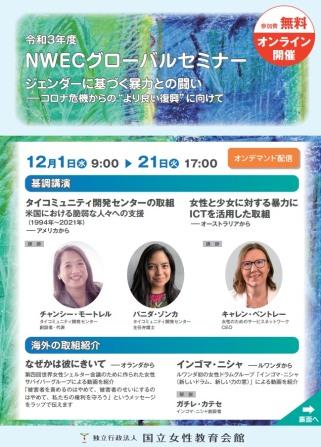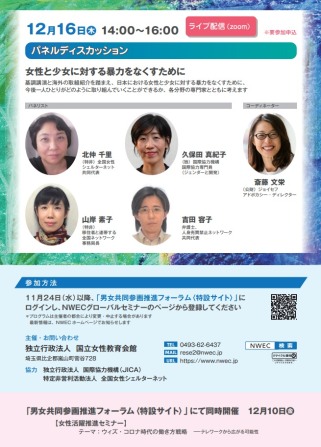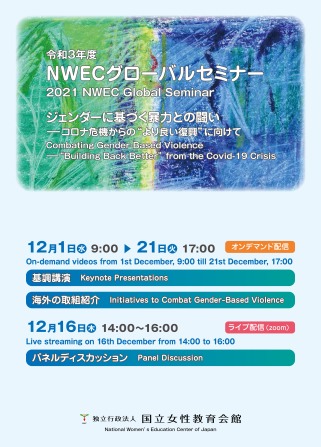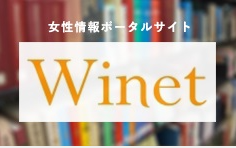International Cooperation
- HOME
- International Cooperation
- NWEC Global Seminar
- FY2021 NWEC Global Seminar: Combating Gender-Based Violence – “Building Back Better” from the Covid-19 Crisis
NWEC Global Seminar
- Event Report
-
FY2021 NWEC Global Seminar: Combating Gender-Based Violence – “Building Back Better” from the Covid-19 Crisis
Date:From December 1st, 2021 to December 21st, 2021
Place:Online /
FY2021 NWEC Global Seminar was held on the theme of “Combating Gender-Based Violence: ‘Building Back Better’ from the Covid-19 Crisis” from Wednesday, December 1 to Tuesday, December 21, 2021.
This year's seminar featured on-demand videos of the keynote presentations and reports on overseas initiatives, and live streaming of the panel discussion.
●Keynote Presentations
For the keynote presentations, the Thai Community Development Center (Thai CDC), which is based in Los Angeles, USA, reported on its efforts to empower vulnerable groups such as victims of trafficking in persons and immigrants; and the Women’s Service Network (WESNET) introduced its ICT-facilitated initiatives for survivors of violence against women, and other support initiatives undertaken during the Covid-19 pandemic in Australia.
Thai Community Development Center (Thai CDC)
Ms. Chanchanit (Chancee) Martorell, Founder and Executive Director, and Ms. Panida Rzonca, Directing Attorney of Thai CDC, gave a presentation titled “Thai Community Development Center: Protecting the Vulnerable since 1994.”
Thai CDC was established in response to riots arising from racial tensions and an earthquake that occurred in Los Angeles in the early 90s. The presentation introduced Thai CDC's long-standing activities to protect the human rights of minority residents, including undocumented Thai nationals; legal support activities for sexually exploited trafficking victims; and activities to promote social and economic empowerment of community members. Thai CDC, which aims to build sustainable communities, has not only provided vaccinations and lump-sum payments during the Covid-19 pandemic, but they have also actively developed outreach activities to support women whose victimization by domestic violence has become less visible due to their being cooped up at home as a result of lockdown measures.
The Women’s Services Network (WESNET)
Ms. Karen Bentley, CEO of WESNET, gave a presentation on “Violence against Women and Girls in a Digital World” in which she reported on cases of digital violence and the impact of digital violence on women and girls.
WESNET has been providing advanced ICT-facilitated support to women survivors of violence, both on its own and in partnerships with corporations and local governments, enabling women to learn how to use technology safely and break the vicious cycle of digital violence domination. Their report concluded by noting that each of us have a role to play in the prevention of violence against women and not only do we need to support women and girls who have suffered violence and intervene in a timely manner to prevent violence before it worsens, but that it was important to promote gender equality.
●Overseas Initiatives to Combat Gender-Based Violence
Two overseas initiatives were introduced: The rap song “Ask him why” and the female drum group “Ingoma Nshya” (New Drum, New Power).
Rap song “Ask him why”
Noting this song had been created by a group of women survivors of gender-based violence as a message to share at the 4th World Conference of Women’s Shelter, Chisato Kitanaka, Executive Director of the All Japan Women’s Shelter Network, explained that the lyrics had been inspired by the words of women who have battled domestic and sexual violence around the world; that “Ask him why” was a song about getting help, getting through, healing, recovering, and empowerment; and that it was important to spread the message “Stop blaming the victim; protect their rights.”
Female drumming group “Ingoma Nshya” (meaning New Drum, New Power)
Ms. Gakire Katese, founder of Rwanda’s first women’s drumming group “Ingoma Nshya,” introduced the background to the group’s creation, changes in mindsets achieved through drumming, and the gender discrimination and gender norms that exist in Rwandan society. The genocide that occurred in Rwanda in 1994 led to a decline in the male population, and although women have been responsible for the country’s recovery, they have been excluded from the arts. The video showed that by responding to her call, women who were unable to go to school and wives who had lost their husbands had come together to form a drumming group that had developed to the extent that they hold drumming concerts all over the world, which now provides the women social and economic independence. Although Rwanda has been promoting gender equality throughout the country, sexism and gender norms are still deeply ingrained, and Ms. Katese continues working to make Rwanda’s cultural landscape more women-friendly.
●Panel Discussion
In the panel discussion titled “Combating Violence against Women and Girls - Beyond Covid-19 Crisis,” the panelists from organizations working in various fields to eliminate violence against women and girls convened to consider the issue together, and reflected on the keynote presentations and overseas initiatives.
Kicking off the panel discussion, the coordinator, Ms. Fumie Saito, Director of Global Advocacy at the Japanese Organization for International Cooperation in Family Planning (JOICFP), referred to the keynote presentations and overseas initiatives as she spoke about increases in the number of consultations on domestic violence as a pandemic arising in the shadow of the Covid-19 pandemic. Touching on changes observed by involved individuals over the 20 years since the Act on the Prevention of Spousal Violence and the Protection of Victims (DV Act) was enacted and remaining issues, she emphasized the importance of raising the issue of violence against women now.
In the first half of the discussion, panelists introduced their respective efforts to combat violence against women and girls.
Ms. Chisato Kitanaka, Executive Director of the All Japan Women’s Shelter Network, addressed the theme “Prevention of Gender-based Violence is a Global Trend: Commonalities and Challenges Through World Shelter Movement.” Introducing the world shelter movement, she touched on the need for a conceptual approach to support; new initiatives and challenges in shelter management during the Covid-19 pandemic; and new forms of violence such as digital sex abuse.
Ms. Yoko Yoshida, Lawyer and Co-Chair of the Japan Network Against Trafficking in Persons (JNATIP), spoke on the theme of “Law Support for Domestic Violence, Sexual Crime, Human Trafficking Victims: Challenges and Ways Forward.” Introducing laws pertaining to sexual violence, trafficking in persons, and spousal violence, she noted the fact that existing laws were limited to punishing perpetrators and protecting victims, and stated it was important to review them and focus on the prevention of violence and provision of support, taking into consideration the fact that the economic gap between men and women lies behind violence against women.
Ms. Motoko Yamagishi, Secretary General of the Solidarity Network with Migrants Japan (SMJ), spoke on the “Current Status of and Challenges in Domestic Violence against Migrant Women: Toward Empowerment of the Survivors.” Noting that non-Japanese women living in Japan often fall into a vulnerable position due to factors such as language, cultural barriers and status of residence; and that it was difficult to provide them with appropriate support in response to domestic violence, she stated the importance of building communities with stronger ties between involved individuals, and helping such individuals make their voices heard.
Ms. Makiko Kubota, Senior Advisor on Gender and Development at the Japan International Cooperation Agency (JICA), spoke on “Toward the Elimination of Violence against Women and Girls: Efforts and Challenges of International Cooperation.” Touching on the fact that although various forms of violence occur in different regions and societies around the world, in all cases, affected women are forced to remain silent and the perpetrators escape punishment, she stated the importance of strengthening survivor-centered support systems and promoting awareness and behavioral change in local communities.
In the latter half of the panel discussion, the coordinator, Ms. Saito, posed the question: How should we tackle gender-based violence based on overseas efforts? Ms. Kitanaka referred to WESNET’s advanced efforts against digital violence, and shared the challenge presented by the fact that in Japan, cooperation between private shelters, government, and businesses is tenuous, and the extent to which public spousal violence counseling and support centers established in each prefecture are able to develop their activities independently is limited. Ms. Yoshida talked about how women who were victims of violence had raised their voices in the rap song “Ask him why,” and touched on the importance of women gaining economic power and speaking out with self-esteem. Referring to the efforts of Thai CDC, Ms. Yamagishi pointed out the importance of providing comprehensive legal and social support (counseling, casework, food and housing support), fair legal system support, equitable and sustainable community building, and comprehensive victim empowerment for vulnerable groups in society. Ms. Kubota touched on the efforts of Ingoma Nshya, the female drumming group that has helped female survivors regain their strength and self-esteem, and how Ingoma Nshya, with the support of young female entrepreneurs from Blue Marble Ice Cream in the USA, had launched Rwanda’s first ice cream store, Sweet Dreams. With regard to strengthening support systems, she emphasized the importance of listening carefully to the voices of local women and helping them build networks that will connect them with various stakeholders.
In response to a second question from the coordinator, “When addressing violence against women from various positions, what are the top priority issues that need to be addressed in the areas of prevention, awareness-raising, protection, recovery and support becoming self-reliant?” Ms. Kubota mentioned the need to learn from grassroots activities in order to support survivors reestablish their lives, and Ms. Yamagishi emphasized the need for mid- to long-term recovery after temporary protection, support for becoming self-reliant, and detailed support for non-Japanese residents in Japan. Ms. Yoshida stated that supporters should be aware of the relationship between power and control and their own gender norms, and that women can enhance their ability to speak up by becoming economically independent. Referring to the Istanbul Convention on the protection of women from all forms of violence and the prevention, prosecution and elimination of violence against women and domestic violence, and the fact that punishment of perpetrators and victim-centered support are more advanced overseas, Ms. Kitanaka suggested that Japan should learn from international standards and implement appropriate measures.
Participants also shared many opinions and questions, and a lively discussion ensued.
At the end of the seminar, looking ahead to the post-Covid-19 society, the participants reaffirmed that in order to eliminate gender-based violence, it would be necessary to take measures to change the social inequalities that underlie gender-based violence, to provide support that ensures no one is left behind, and to collaborate with various actors both domestically and internationally. All in all, the seminar proved to be very meaningful in that it provided insight on what Japan needs in the future and what each of us should do to fight against gender-based violence.

International Cooperation
- International Seminar
- FY2019 Seminar for Gender Equality Officers and Women Leaders in the Asia Region
- FY2018 Seminar for Gender Equality Officers and Women Leaders in the Asia Region
- FY2017 Seminar for Gender Equality Officers and Women Leaders in the Asia Region
- FY2016 Seminar for Gender Equality Officers and Women Leaders in the Asia Region
- FY2015 Seminar for Gender Equality Officers and Women Leaders in the Asia Pacific Region
- FY2014 Seminar for Gender Equality Officers and Women Leaders in the Asia Pacific Region
- FY2013 Seminar for Gender Equality Officers and Women Leaders in the Asia Pacific Region
- FY2012 Seminar for Gender Equality Officers and Women Leaders in the Asia Pacific Region
- FY2011 Seminar for Gender Equality Officer and Women Leaders in the Asia Pacific Region
- FY2010 Empowerment Seminar for Women Leaders in the Asia Pacific Region
- FY2009 Empowerment Seminar for Women Leaders in the Asia Pacific Region Final Report
- FY2008 Empowerment Seminar for Women Leaders in the Asia Pacific Region
- FY2007 Empowerment Seminar for Women Leaders in the Asia Pacific Region
- FY2006 Empowerment Seminar for Women Leaders in the Asia Pacific Region
- NWEC Global Seminar
- FY2023 NWEC Global Seminar: Gender Mainstreaming & Strengthening Institutional Mechanism with Gender Perspective
- FY2022 NWEC Global Seminar: Does Digital Technology Advance Gender Equality?
- FY2021 NWEC Global Seminar: Combating Gender-Based Violence – “Building Back Better” from the Covid-19 Crisis
- FY2020 NWEC Global Seminar: Covid-19 and Gender
- FY2019 NWEC Global Seminar: Gender and Media
- FY2018 NWEC Global Seminar: Promotion of the Advancement of Women - What Japan can learn from Iceland about Gender Equality?
- FY2017 NWEC Global Seminar: Promotion for Advancement of Women Lessons from Germany
- FY2016 NWEC Global Seminar: Promotion for Advancement of Women –Lessons from Europe
- FY2015 International Symposium: Gender Equality and Women's Empowerment
- FY2014 International Symposium: Keys to Diversity and Women's Leadership
- FY2013 NWEC International Symposium:Gender Equality for Men
- FY2012 NWEC International Symposium:To Make a Society without Violence against Women a Reality
- FY2011 NWEC International Symposium
- FY2010 International Forum for Women's Empowerment
- FY2009 International Forum for Women's Empowerment
- FY2008 International Forum for Women's Empowerment Final Report3
- FY2008 International Forum for Women's Empowerment Final Report2
- FY2008 International Forum for Women's Empowerment Final Report1
- Cooperation with JICA
- FY2023 Knowledge Co-creation Program "Promotion of Networking among ASEAN Countries on Anti-Trafficking in Persons”
- FY2023 Knowledge Co-Creation Program "Eradicating Sexual and Gender-Based Violence (SGBV)"
- FY2022 Knowledge Co-creation Program "Promotion of Networking among ASEAN Countries on Anti-Trafficking in Persons”
- FY2022 Knowledge Co-Creation Program "Eradicating Sexual and Gender-Based Violence (SGBV)"
- FY2021 Knowledge Co-creation Program "Promotion of Networking among ASEAN Countries on Anti-Trafficking in Persons”
- FY2020 Knowledge Co-creation Program "Promotion of Networking among ASEAN Countries on Anti-Trafficking in Persons”
- FY2019 Knowledge Co-creation Program "Promotion of Networking among ASEAN Countries on Anti-Trafficking in Persons”
- FY2018 Knowledge Co-creation Program "Promotion of Networking among ASEAN Countries on Anti-Trafficking in Persons”
- Issue-specific Training “Seminar on Promotiom of Networking among ASEAN Countries on Anti-Trafficking in Persons”
- Basic Information-Gathering Survey/Workshop Seminar on the Economic Independence for Women in Central America and the Caribbean (El Salvador/Dominican Republic)
- Regional Gender Seminar in Central and South America
- 2015 Issue-specific Training "Seminar on Promotion of Networking among Asian Countries on Anti-Trafficking in Persons"
- Seminar on the Promotion of Education for Girls and Women II
- International Conference/International Exchange
- Meeting with Korean Women’s Development Institute (KWDI)
- The Coalition of Finnish Women's Associations (NYTKIS) Secretary General Ms. KAKKOLA’s Courtesy Call to Foreign Minister KAMIKAWA
- The Coalition of Finnish Women's Associations (NYTKIS) Secretary General Ms. KAKKOLA’s Japan Visit Program
- The 67th Session of the Commission on the Status of Women
- NGO CSW67 Forum
- Webinar with Korean Women’s Development Institute (KWDI)
- The 66th Session of the Commission on the Status of Women (Hybrid format)
- Online meeting with international graduate students from the Appropriate Technology course at the University of Tsukuba
- The 65th session of the Commission on the Status of Women
- Lecture "The Beate Sirota Gordon Archives at Mills College"
- Participation in 2nd AGenT
- The 64th session of the Commission on the Status of Women
- Dr. Wang from National Taiwan University visits NWEC
- Japan Network of Women Engineers and Scientists and The Japan Inter-Society Liaison Association Committee for Promoting Equal Participation of Men and Women in Science and Engineering: 9th Japan Korea China Women Leaders Forum for Science & Technology
- Researcher from the KWDI visits NWEC
- Visit by a delegation from the Socialist Republic of Vietnam Ministry of National Defense
- Briefing on the Reykjavik Index for Leadership
- Women's Archives Center Exhibition "Beate Sirota Gordon and gender equality in Japanese Constitution"
- Visit from the Guangxi Women’s Federation
- Participation in the 63rd Session of the Commission on the Status of Women
- 7th Global Forum on Gender Statistics
- FY2018 International Symposium hosted by Korean Institute for Gender Equality Promotion and Education “Gender Equality at Schools”
- Visit from All-China Women’s Federation(ACWF)
- Participation in the 62nd Session of the Commission on the Status of Women
- The 14th KIGEPE International Symposium “Empowering Women’s Leadership: expanding influence and innovation”
- Participation in the 61st Session of the Commission on the Status of Women
- Visit from the Batis Center for Women
- 2011 Asia Women Eco-Science Forum (a forum of science and engineering leaders in Japan, China and Korea)
- The 60th Session of the Commission on the Status of Women
- The 59th Session of the United Nations Commission on the Status of Women
- The 58th Commission on the Status of Women
- The 57th Session of the United Nations Commission on the Status of Women
- International Symposium: Gender Awareness Education for Sustainable Development
- Thirtieth Anniversary Programs
- Attendance at the Ceremony Commemorating the 25th Anniversary of the Korean Women’s Development Institute (KWDI)
- Japanese-Filipino children (JFC)* from the Philippines-based NGO “DAWN” visit the Center
- Visitors from Abroad to NWEC
- Research report on Multicultural Family Support in South Korea
- Workshop on Gender and Education: Life-long Learning for Women’s Empowerment
- Lecture Delivered by a Visiting Researcher
- Connections: Bringing Together the Next Generation of Women Leaders in Science, Technology, Engineering and Mathematics
- Conclusion of Memorandum of Understanding on Exchange and Cooperation with the Ministry of Women's Affairs, Royal Government of Cambodia
- Visit to Japan by the Minister of Women’s Affairs of the Royal Government of Cambodia
- KIGEPE Delegation Visit
- Officials of Ministry of Information and Communications of the Socialist Republic of Vietnam visited NWEC
- The 56th Commission on the Status of Women
- Dr. Barker's visit
- Multidisciplinary Intellectual Exchange for Women Leaders from the United States, Japan, South Korea and the Philippines
- Courtesy visit to University of Hawai`i
- Delegation of Board for the Advancement of Women, Ministry of Finance of the Socialist Republic of Vietnam visited NWEC
- Visit Korean Women's Development Institute (KWDI)
- Report on Participation in the 5th World Social Forum on Migration
- A group led by the Vice President of the Korean Women's Development Institute visited NWEC
- A disaster management specialist from India visits the Center
- Visit to the Korean Institute for Gender Equality Promotion & Education (KIGEPE) and others
- Secretary of State, Ministry of Justice, Kingdom of Cambodia visited NWEC
- Research conducted in the Republic of the Philippines
- Research on the Comparative Study of the Gender Equality Policy in Southeast Asian Countries in the Kingdom of Cambodia
- Ochanomizu University and A Canadian Women’s Study Researcher visited NWEC
- Aigyung Yang, Research Fellow and Former Director of Strategy Board for Women Friendly Policies of the Korean Women's Development Institute (KWDI) Visits NWEC
- Delegation of the Ministry of Defense of the Socialist Republic of Vietnam visited NWEC
- Delegation from the Women and Development Center, of the Vietnam Women's Union, Visited NWEC
- The "7th Asia-Pacific Forum on Development and Gender" was held in Seoul, South Korea
- HOME
- International Cooperation
- NWEC Global Seminar
- NWEC Global Seminar
- FY2021 NWEC Global Seminar: Combating Gender-Based Violence – “Building Back Better” from the Covid-19 Crisis





